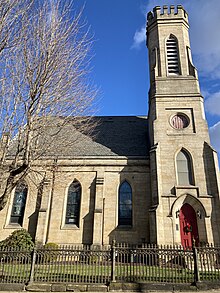
The Cathedral Church of All Saints is the bishop's church of the Episcopal Diocese of Milwaukee, in Milwaukee, Wisconsin, USA. The current parish is a descendant of a small mission by the Right Reverend Jackson Kemper. It is located in Milwaukee's downtown Yankee Hill neighborhood.

The Episcopal Diocese of Pittsburgh is a diocese in the Episcopal Church in the United States of America. Geographically, it encompasses 11 counties in Western Pennsylvania. It was formed in 1865 by dividing the Episcopal Diocese of Pennsylvania. The diocesan cathedral is Trinity Cathedral in downtown Pittsburgh. The Rt. Rev. Ketlen A. Solak was consecrated and seated as its current bishop in autumn 2021.

Trinity Cathedral is an Episcopal Church in downtown Pittsburgh, Pennsylvania and is the cathedral for the Episcopal Diocese of Pittsburgh.

St. Peter's Episcopal Church, also known as St. Peter's Church, is located in downtown Albany, New York, United States. It was designed in the mid-19th century by Richard Upjohn and his son Richard M. Upjohn in the French Gothic Revival architectural style. It was listed on the National Register of Historic Places in 1972, and designated a National Historic Landmark eight years later. It is also a contributing property to the Downtown Albany Historic District.

Christ Church — known also as Christ Church, Washington Parish or Christ Church on Capitol Hill — is a historic Episcopal church located at 620 G Street SE in Washington, D.C., USA. The church is also called Christ Church, Navy Yard, because of its proximity to the Washington Navy Yard and the nearby U.S. Marine Barracks.

St. Ann's Episcopal Church is an historic Episcopal church located on Church Street in Richford, Vermont, in the United States. Built in 1883, it is an architecturally a distinctive blend of Queen Anne and Gothic Revival architecture. On March 12, 2001, it was added to the National Register of Historic Places. The church is a defunct mission of the Episcopal Diocese of Vermont; no services are held there.
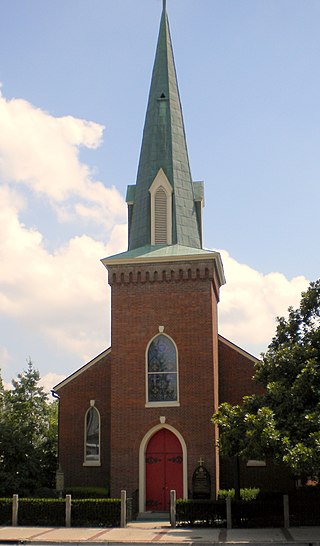
Trinity Episcopal Church in Danville, Kentucky was one of the first churches organized in the Episcopal Diocese of Kentucky. Trinity Church is the oldest in-use church structure in Danville and the oldest continuously used Episcopal church building in the Episcopal Diocese of Lexington as well as the second oldest in Kentucky. It is listed in the National Register of Historic Places.

St. Stephen's Episcopal Church, in Beverly, Burlington County, New Jersey, United States, is located on the corner of Warren and Wilmerton streets in Beverly. While the St. Stephen's community worshipped at the site beginning in 1837, the current church building was consecrated in 1855 and the rector presently serving the congregation is Fr. Robert Legnani.
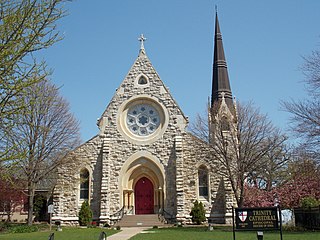
Trinity Episcopal Cathedral, formerly known as Grace Cathedral, is the historic cathedral in the Diocese of Iowa. The cathedral is located on the bluff overlooking Downtown Davenport, Iowa, United States. Completed in 1873, Trinity is one of the oldest cathedrals in the Episcopal Church in the United States. It was individually listed on the National Register of Historic Places in 1974. In 1983 the cathedral was included as a contributing property in the College Square Historic District, which is also listed on the National Register.
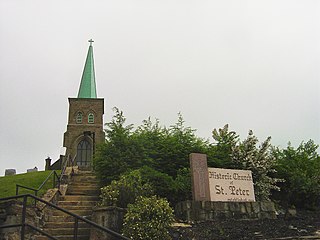
The Historic Church of St. Peter is a Roman Catholic church in Brownsville, Pennsylvania, in the Diocese of Greensburg. The Historic Church of St. Peter also has a partner parish in Grindstone, Pennsylvania named St. Cecilia's Roman Catholic Church, which was built in 1931.

St. Paul's Episcopal Cathedral, is located in downtown Des Moines, Iowa, United States. It is the cathedral church of the Episcopal Diocese of Iowa. The building was listed on the National Register of Historic Places as St. Paul's Episcopal Church.

St. Stephen's Church, also known as St. Stephen's Episcopal Church, is an historic church located at 6807 Northumberland Highway, Heathsville, Northumberland County, in the Northern Neck of Virginia. Built in 1881, it was designed in the Carpenter Gothic style by T. Buckler Ghequiere. On December 28, 1979, it was added to the National Register of Historic Places. It remains in use by an active parish in the Episcopal Diocese of Virginia. It is located in the Heathsville Historic District.

The Church of St Mary the Virgin in Middleton, West Yorkshire, England is an active Anglican parish church in the Armley deanery in the archdeaconry of Leeds and the Diocese of Leeds. The church and its lych gate are Grade II listed buildings.
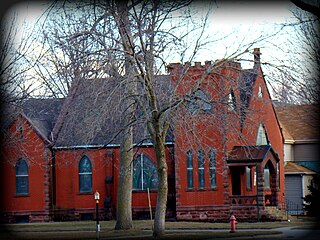
Trinity Memorial Episcopal Church is a former parish church in the Episcopal Diocese of Iowa. The historic building is located in Mapleton, Iowa, United States. It was listed on the National Register of Historic Places in 1990. The former church building and hall now house the Museum of American History.

St. Paul's Episcopal Church is a historic Episcopal parish in Medina, Ohio, United States. Formed in the 1810s as Medina's first church, it worships in a high Gothic Revival church building constructed in the 1880s, which has been named a historic site.

St Mary's Cathedral Church, also known as St Mary's Church, is an Anglican church located in Parnell Road, Parnell, a suburb of Auckland, New Zealand. The building served as the cathedral church and principal Anglican church of the Diocese of Auckland until 1973 when the chancel of Holy Trinity Cathedral, for which the foundation stone was laid in 1957, came into use.

Christ Church is in King's Road, Higher Bebington, Wirral, Merseyside, England. It is an active Anglican parish church in the deanery of Wirral, North, the archdeaconry of Chester, and the diocese of Chester. The church is recorded in the National Heritage List for England as a designated Grade II listed building.

Christ Church, also known as Christ Episcopal Church, is a Christian house of worship located on the corner of Church Street and Main Street in Newton, New Jersey. It is a parish overseen by the Episcopal Diocese of Newark, a diocese of the Episcopal Church in the United States of America. The congregation first met on 28 December 1769 and was granted a charter by New Jersey's last Royal Governor William Franklin on behalf of Britain's King George III. Christ Church is the oldest church in Newton and the third oldest parish in the Diocese of Newark.

Christ Church Accokeek is an Anglican parish church and cemetery in Accokeek, Maryland. Founded in 1698 as a chapel of ease, the present brick structure dates to 1747 and the cemetery to 1775. In 2021, after decades of conflict with the Episcopal Diocese of Washington, the congregation left the Episcopal Church and joined the Anglican Church in North America. The church is listed on the Maryland Historical Trust's Maryland Inventory of Historic Properties.
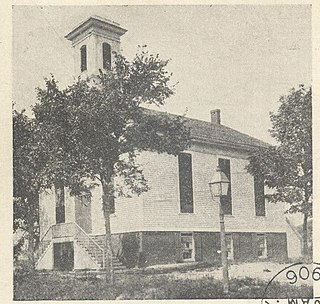
Bishop Seabury Anglican Church is a historic Anglican church located in Gales Ferry, Ledyard, Connecticut. Founded in Groton in 1875 as part of the Episcopal Diocese of Connecticut and named in honor of Samuel Seabury, the congregation left the Episcopal Church during the Anglican realignment and is now a member of the Anglican Diocese of the Living Word in the Anglican Church in North America. In leaving the Episcopal Church, Bishop Seabury lost in litigation seeking to retain its building, and since 2018 the church has been located in the former Gales Ferry Methodist Church, built in 1857, a contributing property to Gales Ferry Historic District #2.
